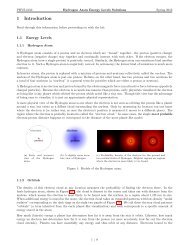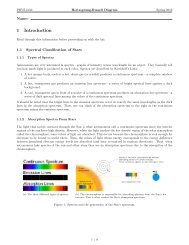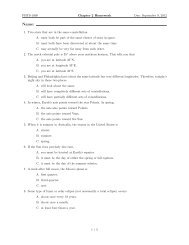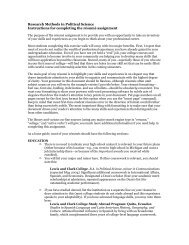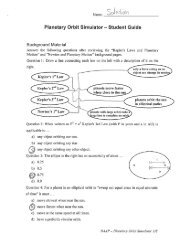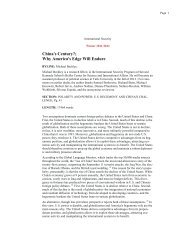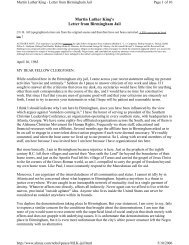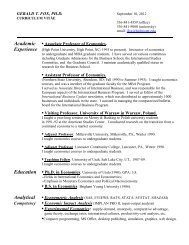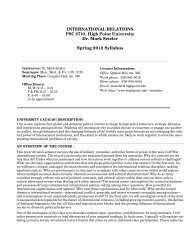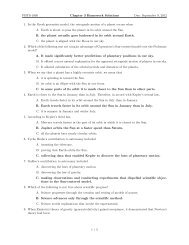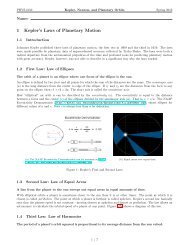China's Challenge to US Hegemony - High Point University
China's Challenge to US Hegemony - High Point University
China's Challenge to US Hegemony - High Point University
Create successful ePaper yourself
Turn your PDF publications into a flip-book with our unique Google optimized e-Paper software.
14 • CURRENT HISTORY • January 2008<br />
1990s. Broadly speaking, the debate about how the<br />
United States should respond <strong>to</strong> China’s emergence<br />
as a great power has focused on two policy alternatives:<br />
engagement and containment.<br />
Engagement assumes that, as China’s contacts<br />
with the outside world multiply, its exposure <strong>to</strong><br />
Western (that is, mostly American) political and<br />
cultural values will result in evolutionary political<br />
change within China. The proponents of engagement<br />
believe that the forces of domestic political<br />
liberalization and economic globalization will temper<br />
Beijing’s foreign policy ambitions and lead <strong>to</strong> a<br />
peaceful Sino-American relationship.<br />
On the economic side, the logic of engagement is<br />
that, as China becomes increasingly tied <strong>to</strong> the international<br />
economy, its interdependence with others<br />
will constrain it from taking political actions that<br />
could disrupt its vital access both <strong>to</strong> foreign markets<br />
and capital and <strong>to</strong> high-technology imports from<br />
the United States, Japan,<br />
and Western Europe.<br />
This was the claim made<br />
in the 1990s by the Clin<strong>to</strong>n<br />
administration and its<br />
supporters during a debate<br />
about whether the United<br />
States should extend permanent normal trade relations<br />
<strong>to</strong> China and support Beijing’s accession <strong>to</strong> the<br />
World Trade Organization.<br />
Proponents of engagement have also argued<br />
that the United States can help foster political liberalization<br />
in China by integrating the country<br />
in<strong>to</strong> the international economy and embedding it<br />
in the complex web of international institutional<br />
arrangements. A China so engaged, it is said, will<br />
have strong interests in cooperation and will not<br />
be inclined <strong>to</strong> pursue security competition with<br />
America or with its Asian neighbors.<br />
Engagement is a problematic strategy, however,<br />
because it rests on a shaky foundation. The conventional<br />
wisdom notwithstanding, there is little<br />
support in the his<strong>to</strong>rical record for the idea that<br />
economic interdependence leads <strong>to</strong> peace. After all,<br />
Europe never was more interdependent (not only<br />
economically but also, among the ruling elites, intellectually<br />
and culturally) than before World War I. It<br />
was famously predicted, on the eve of World War I,<br />
that the economic ties among Europe’s great powers<br />
had ushered in an era in which war among them<br />
was unthinkable. Yet, as we know, the prospect of<br />
forgoing the economic gains of trade did not s<strong>to</strong>p<br />
Europe’s great powers from fighting a prolonged and<br />
devastating war.<br />
Beijing’s actual foreign policy furnishes a concrete<br />
reason <strong>to</strong> be skeptical of the argument that<br />
interdependence leads <strong>to</strong> peace. China’s behavior<br />
in the 1996 crisis with Taiwan (during which it<br />
conducted missile tests in waters surrounding the<br />
island in the run-up <strong>to</strong> Taiwan’s presidential election)<br />
suggested it was not constrained by fears that<br />
its muscular foreign policy would adversely affect<br />
its overseas trade.<br />
Of course, during the past decade, China has<br />
been mindful of its stake in international trade<br />
and investment. But this does not vindicate the<br />
us strategy of engagement. China’s current policy<br />
reflects the fact that, for now, Beijing recognizes its<br />
strategic interest in preserving peace in East Asia.<br />
Stability in the region, and in Sino-American relations,<br />
allows China <strong>to</strong> become richer and <strong>to</strong> catch<br />
up <strong>to</strong> the United States in relative power. For a<br />
state in China’s position vis-à-vis the United States,<br />
this is the optimal realpolitik<br />
strategy: buying time<br />
for its economy <strong>to</strong> grow<br />
The era of American hegemony is<br />
so that the nation can<br />
drawing <strong>to</strong> a close right before our eyes.<br />
openly balance against<br />
the United States militarily<br />
and establish its own<br />
regional hegemony in East Asia. Beijing is pursuing<br />
a peaceful policy <strong>to</strong>day in order <strong>to</strong> strengthen<br />
itself <strong>to</strong> confront the United States <strong>to</strong>morrow.<br />
The belief that a democratic—or more liberal—<br />
China would be pacific and collaborative in its<br />
external policies is similarly dubious. This view<br />
rests on the so-called “democratic peace theory”<br />
which is near and dear <strong>to</strong> many us foreign policy<br />
experts. In fact, the democratic peace theory is<br />
another one of those bits of foreign policy conventional<br />
wisdom that is based on flimsy evidence.<br />
The his<strong>to</strong>rical record demonstrates that when vital<br />
national interests have been at risk, democratic<br />
states have routinely practiced big-stick diplomacy<br />
against other democracies (including threats <strong>to</strong> use<br />
force). In other words, when the stakes are high<br />
enough, great powers act like great powers even in<br />
their relations with other democracies. Thus, even<br />
if China does undergo political liberalization in the<br />
future, there is no reason <strong>to</strong> believe that its foreign<br />
policy behavior would be fundamentally affected.<br />
A us containment strategy for China differs from<br />
engagement in that it relies mostly on the traditional<br />
“hard power” <strong>to</strong>ols of military might and alliance<br />
diplomacy <strong>to</strong> thwart China’s great power emergence.<br />
Containment calls for the United States <strong>to</strong> emulate<br />
its anti-Soviet cold war strategy by assembling a




